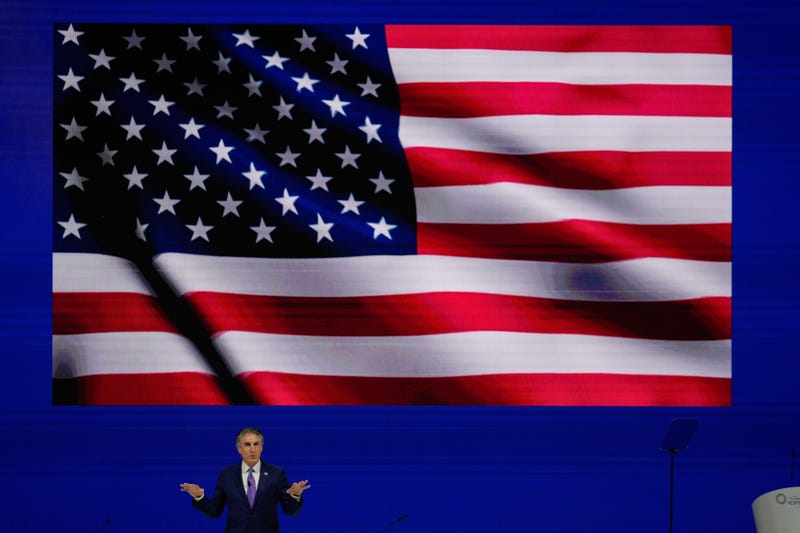
ABU DHABI, United Arab Emirates (AP) — Abu Dhabi opened a major oil summit Monday with officials offering bullish optimism that power demands for artificial intelligence and global aviation will boost energy prices, just hours after OPEC+ paused production increases planned for next year.
The comments at the annual Abu Dhabi International Petroleum Exhibition and Conference in the Emirati capital highlighted the contradictions in the market and in the United Arab Emirates, a major oil producer that hosted the United Nations COP28 climate talks in 2023.
Sultan al-Jaber, the head of the state-run Abu Dhabi National Oil Co. who led COP28, described the energy market as needing “reinforcement, not replacement.” U.S. Interior Secretary Doug Burgum applauded al-Jaber's remarks and criticized what he described as “a set of policies that have been driven by an ideology around climate extremism.”
“The demand for power is going to go up and up and up," Burgum said. "Today’s the day to announce that there is no energy transition. There is only energy addition.”
OPEC+ halts first-quarter production hikes
On Sunday, OPEC+ met and decided to increase its production by an additional 137,000 barrels of oil beginning in December. However, it said other adjustments planned in January, February and March of next year would be paused “due to seasonality.”
OPEC+ includes the core members of the cartel, as well as nations outside of the group led by Russia.
Benchmark Brent crude sold Monday around $65 a barrel, down from a post-COVID high of some $115 a barrel after Russia’s full-scale invasion of Ukraine in 2022. It had fallen to $60 a barrel in recent days over concerns that the market had too much production.
“Yes, OPEC+ is blinking, but it’s a calculated move,” said Jorge León, the head of geopolitical analysis at Rystad Energy. “Sanctions on Russian producers have injected a new layer of uncertainty into supply forecasts, and the group knows that overproducing now could backfire later. By pausing, OPEC+ is protecting prices, projecting unity and buying time to see how sanctions play out on Russian barrels.”
Suhail al-Mazerouei, the Emirates' energy and infrastructure minister, however, dismissed any idea long-term of too much oil being in the market.
“I’m not going to talk about a an oversupply scenario," he said. "I can’t see that. I can’t justify that. And I think all of what we are seeing is more demand.”
Burgum backs production, knocks Russia
Burgum, a former Republican governor of North Dakota and the chair of U.S. President Donald Trump’s National Energy Dominance Council, was on hand for the Abu Dhabi oil summit on Monday. He praised the partnership oil-producing Gulf Arab states have with America, saying: "We share a belief about energy policy.”
“People have described the climate as an existential threat. Again, to help people understand U.S. energy policy, we are focused on two substantial threats. One is Iran could not have a nuclear weapon," Burgum said. “But the second thing is that the free world cannot lose the AI arms race. ... You need chips, you need software models and you need more electricity.”
The average price for a gallon of gasoline in the U.S., a key economic and political indicator in the country, stood at $3.03 on Monday. Trump also has criticized both OPEC+ and Saudi Arabia at times over the price per barrel, particularly in his first term.
Meanwhile, both the United States and the United Kingdom implemented new oil sanctions targeting Russia over its war on Ukraine. Those sanctions targets included Rosneft and the Russian oil company Lukoil, whose red-and-white logo hung over the annual oil conference. The UAE has maintained close ties to Russia despite the war, but has served as a key interlocutor between Kyiv and Moscow to negotiate prisoner exchanges.
“The Russian and Ukraine war is being funded by energy sales,” Burgum said on a stage that had flashed the Lukoil logo before his remarks.
Climate change worries take a backseat
The oil conference comes after the UAE hosted COP28. Those talks ended with a call by nearly 200 countries to move away from planet-warming fossil fuels — the first time the conference made that crucial pledge. Scientists have called for drastically slashing the world’s emissions by nearly half in the coming years to limit global warming to 1.5 degrees Celsius (2.7 degrees Fahrenheit) compared with pre-industrial times.
But the UAE as a whole still plans to increase its production capacity of oil to 5 million barrels a day in the coming years as it pursues more clean energy at home.
Qatari Energy Minister Saad Sherida al-Kaabi repeated a warning to the European Union that his nation could halt their liquefied natural gas shipments — something crucial due to Russian LNG being banned — over its Corporate Sustainability Due Diligence Directive. That seeks to have companies pursue net-zero emission goals.
“I think, you know, a small part of this conference, unfortunately, changes with politics depending on when it was President Biden and President Trump and so on," al-Kaabi said. "I think that they're not looking at facts and realities and I think we shouldn't be following politics when we look at the lives of people for the future and how much energy we need in the future.”